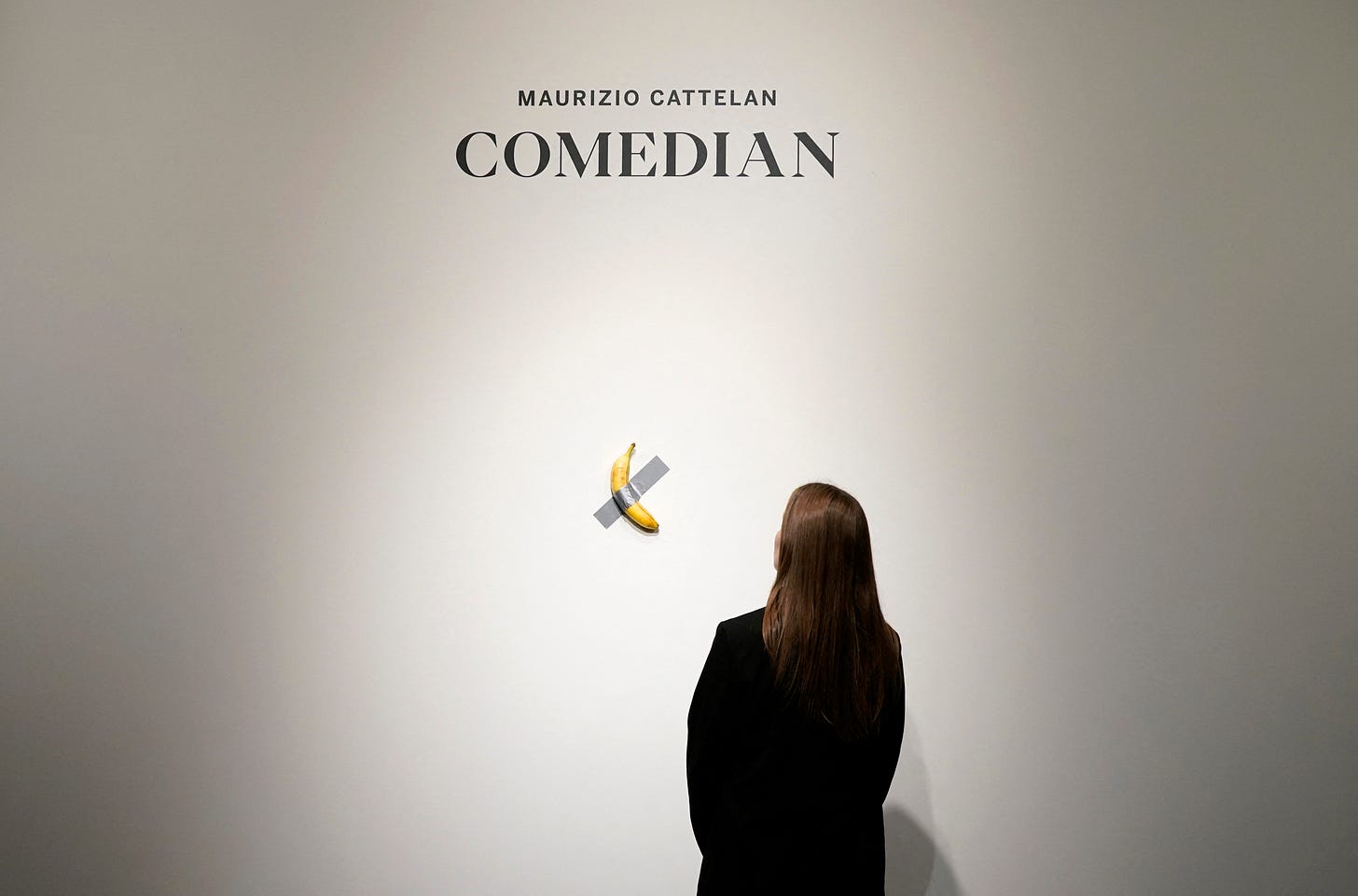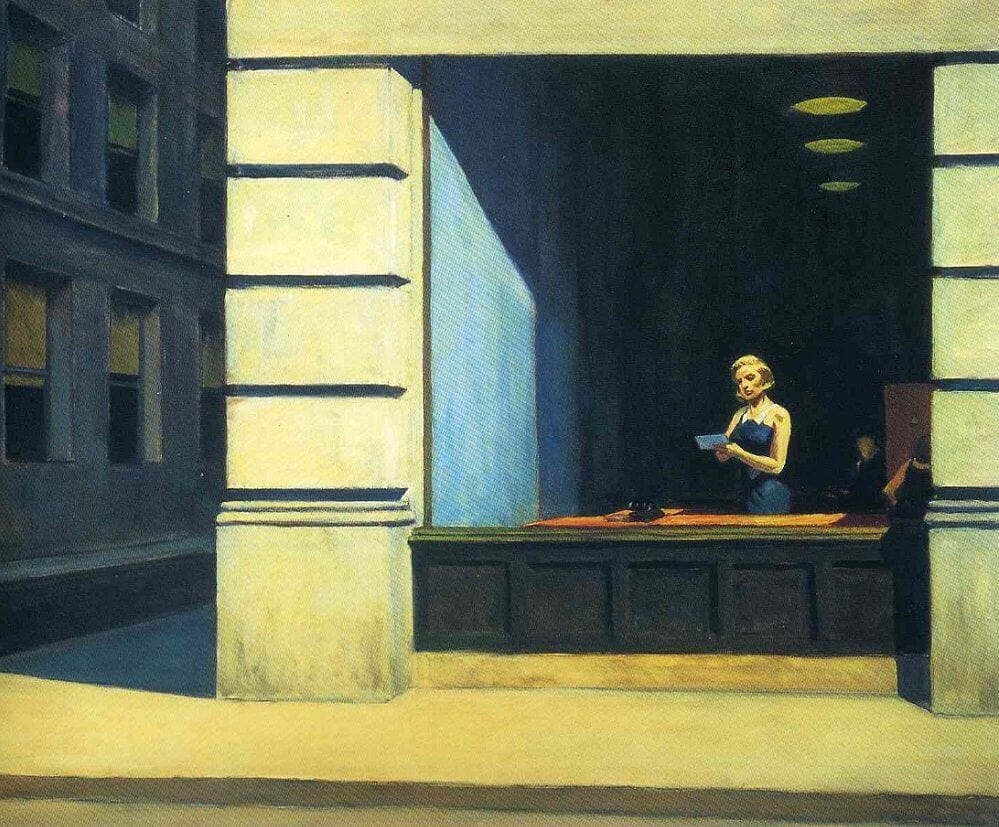Peeling Back the Layers: Work and Leisure
Hello Everyone,
Banana’s are a uniquely versatile fruit, essential and complementary ingredients in smoothies, cakes, pancakes, breads and dessert, and beverages. They can be fried, flambéed, baked, caramelised, and split. I think I understand the value of a banana, and Alam Shah, a fruit vendor on Manhattan’s Upper East Side, definitely understands the value of a banana. He sells dozens for 35 cents each.
Last month he sold a banana which was used in an absurdist piece of art - duct taped to a wall - entitled, “Comedian” by Maurizio Cattelan, auctioned for $6.2 million at Sotheby’s just up the street. According to the New York Times, when Alam was told of the sale price, he began to cry “I am a poor man,” Mr. Alam, 74, said, his voice breaking. “I have never had this kind of money; I have never seen this kind of money.”
I am not sure what to think when I read stories like this. Perhaps it is a tragic reality of the rupture between our priorities and choices, and the needs, threats and challenges that people face. It’s a world where a banana sold on one corner for 35 cents can be auctioned across the street for $6.5 million. Where Taylor Swift can bring in an average of $13 million a night and where Elon Musk’s net worth, now dwarfs the GDP of smaller countries. Perhaps it is time to take a good hard look at the choices we make and the conditions of life that have led to us to certain choices over others.
The Work and Leisure Conundrum
A lot of this has to do with how we spend our work and leisure time. In an essay entitled In Praise of Idleness Bertrand Russell explains that some measure of idleness in society is good. Modern technology and innovation have brought the ability to produce more with less, and this should ideally afford everyone the opportunity for leisure to participate in creative pursuits which feed the mind, spirit and the soul. Russell explains:
I think that there is far too much work done in the world, that immense harm is caused by the belief that work is virtuous, and that what needs to be preached in modern industrial countries is quite different from what always has been preached. Every one knows the story of the traveler in Naples who saw twelve beggars lying in the sun and offered a lira to the laziest of them. Eleven of them jumped up to claim it, so he gave it to the twelfth. This traveler was on the right lines.
Today we face the opposite problem. Our work and leisure lives have irrevocably changed. First, the boundaries between work life and home life are blurred. Work infringes upon home, our transport to and from home and even on vacation. The result is that there is no clear separation as to when work begins and ends. Our sense of leisure, rest, and relaxation is less tangible - so that even though we may be working less and less (see the research here) we feel as though we are working more and more. When boundaries between work and leisure fade so does our imaginative capacity to think beyond our job, and so what we do, becomes the sole basis of who we are.
Secondly, we think too much of consumption and too little of production, to the point where what we consume, now consumes us.
We prioritize entertainment, convenience, attention and efficiency - at the cost of expertise, competence, and excellence. It is easier to collapse on the couch and watch an episode of Bosch than it is to pick up a book. The toll this takes on our attention, satisfaction and contentment is immense. The availability of options and choice have accelerated the innate human predilection for discontentment.
Aldous Huxley in the years before social media existed, observed:
“That we shall be discontented with our good time goes without saying. Every gain made by individuals or societies is almost instantly taken for granted. The luminous ceiling toward which we raise our longing eyes becomes, when we have climbed to the next floor, a stretch of disregarded linoleum beneath our feet.”
Lastly the nature and conception of leisure has changed, from an active engaged leisure to a passive receptive leisure. Russell in 1935 warned that, “the pleasures of urban populations have become mainly passive: seeing cinemas, watching football matches, listening to the radio, and so on.” I would argue that work today for many in Western society now takes up less physical exertion than it did 100 years ago, but the passivity of our leisure activity has only increased: from Netflix instead of a novel, scrolling instead of a stroll, and Twitter instead of theatre.
Leisure as intended by Russell was a means to engage with the world and with each other. Activities like walking in nature, like attending the theatre, or visiting a museum, or enjoying a live performance required active engagement, and interaction with those around us. They encouraged and contributed to a sense of place and self in the world - but the menu of leisure options today do not encourage this cultivation but rather distance our engagement in the world and limit our perspective of it.
Shrinking of Historical Perspective
It is this shrinking sense of perspective that also contributes to a loss of history. A sense of history collapsing. We see this on multiple scales in our educational system, from the slashing of arts and humanities programs and faculties, to the decline in reading among young adults, to shortened attention spans, and a rise in loneliness. Here an engagement with the arts and culture and leisure in particular - can be deeply restorative.
Aldous Huxley, argues for the value of not only the classical tradition but implicitly makes an argument for the importance of arts and culture to humanity and for its ability to place the individual in the context of wider society. For a mind that has engaged with these classics:
“is much more than a disciplined mind; it is an experienced mind. It has come, as Emerson says, into a feeling of immense longevity, and it instinctively views contemporary man and his doings in the perspective set by this profound and weighty experience. Our studies were properly called formative, because, beyond all others, their effect was powerfully maturing.
The same I think can be said of leisure activities. If leisure is to be relaxing, then it must also be restorative, in that it restores our both capacity for engagement with the other, and to see ourselves within this same arc of longevity.
We see this need for belonging everywhere and emerge in different forms. President Obama in his recent remarks at the 2024 Democracy Forum recently pointed to the example of the megachurch phenomenon, noting that this need for belonging has re-emerged: “I’ll give you an example: at a time when organized religion all over America is struggling and in some denominations collapsing, mega churches are actually growing in leaps and bounds… one of the reasons is that mega churches understand that belonging precedes belief.”
Leisure must also exist above and beyond the world of work, we talk of work and leisure as two sides of the same coin. There is work and leisure and we cannot imagine one without the other. There is a freedom that arises when leisure is conceived on its own terms, without the constraints that a constant juxtaposition with work inevitably forces. Josef Piper has argued that, “Leisure is not there for the sake of work, no matter how much new strength the one who resumes working may gain from it; leisure in our sense is not justified by providing bodily renewal or even mental refreshment to lend new vigor to further work… Nobody who wants leisure merely for the sake of “refreshment” will experience its authentic fruit, the deep refreshment that comes from a deep sleep.”
And so perhaps it is in our free time in our leisure that we find the room for what matters in life, for perspective on how we see ourselves in relation to each other, and ultimately what we value, what we decide is important, and what we choose to do with the other aspects of our lives.
Returning to the story of Mr. Alam and the banana, he went on to ask the New York Times reporter, “Those who bought it, what kind of people are they?” he asked. “Do they not know what a banana is?” - Perhaps not.
Thanks for reading.
FK
My Leisure Activity
After that rant on leisure, that please enjoy my latest guilty pleasure. Dua Lipa recently had concert in Mumbai where she performed her hit song “Levitating” with a mashup with a 90’s Bollywood Classic “Woh Ladki Jo Sabse” “This Girl Who is”
Who said leisure time can’t mean cross-cultural connection?



